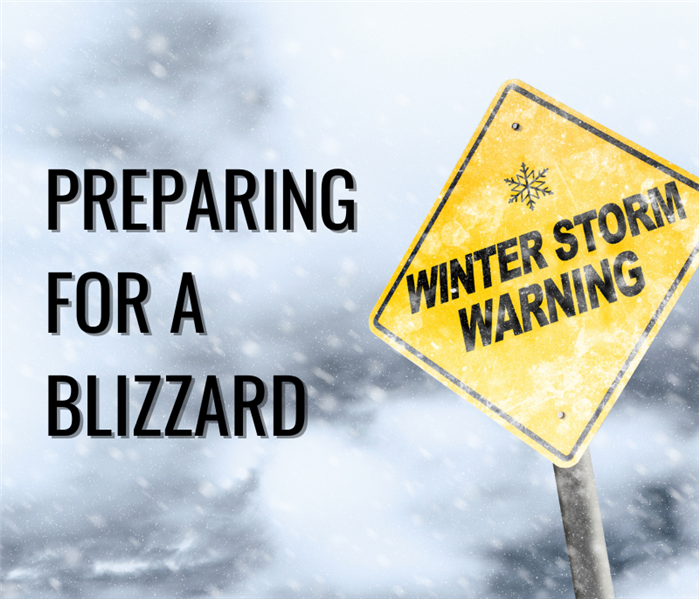Preparing For Blizzards This Winter
11/2/2020 (Permalink)
It’s beautiful to wake up to a winter wonderland in New Jersey, but blizzards can be a nightmare. They can last for days and cause low visibility, extreme cold, power outages, and even disrupt emergency services.
When you know a blizzard is making its way to New Jersey, you should always take steps to prepare to ensure you and your family aren’t left in the cold during extreme weather. Following this checklist should help you be prepared if you’re snowed in this winter.
Preparing For A Blizzard: Checklist
- Prepare or look over your emergency survival kit. You want your kit to have all the proper supplies needed in the event of an emergency or major disaster. Your kit should be easy to grab in a moment's notice in case you must evacuate your home. According to the Red Cross, your emergency kit should at minimum contain the following:
- Water - One gallon per person, per day
- Food - Non-perishable items that are easy to prepare, even without power
- Flashlight - Battery powered and hand-crank is best
- Radio - Battery powered or hand-crank
- Extra batteries
- First aid kit
- Stocked for all everyday medications
- A multi-purpose tool
- Personal hygiene items
- Copies of all important personal documents
- Cell phones and chargers
- Emergency contact information
- Extra cash
- Emergency blanket - These are brightly colors and heat reflective if you are stranded
- Pet supplies
- Prepare your vehicle in case of emergencies or evacuation. Fill your gas tank and be sure your car is ready to drive in winter conditions. A good rule of thumb during the winter is to keep a shovel, salt, or kitty litter in your car in case you get stuck in the snow.
- Charge electronic devices. Your phones should be charged along with any portable chargers you may have. You may also want to charge laptops or portable game systems for something to do if the power goes out.
- Get your home ready. Storm proofing your home is helpful to keep it better insulated from cold winds, especially if you lose power. You can apply weather-stripping to doors and windows and seal any cracks or air gaps. You should also be sure to insulate pipes, especially those on the exterior walls of your home so they do not freeze and burst.
- Prepare warm clothing. Having warm, layered clothing is a must. Gather any winter hats or gloves you may also have around the house.
- Bring any outdoor animals inside or to a safe place. If you shouldn't be out in a blizzard - your animals shouldn't either. Make sure they have enough food and shelter to last the storm.
- Have a secondary heating source ready. If you have a fireplace, be sure to stock up on firewood. If using a portable generator, be sure to get fuel and store it in an airtight gas can.
- Test or install your fire and carbon monoxide detectors. This is especially important in case the power goes out and you utilize a fireplace, portable generator, or candles to have light or heat.
- Make sure you have a snow shovel before the snow starts. Without one, you may be stuck in your house for longer than planned. Getting ice melt, salt, or sand will also be helpful.
- Know where you can seek shelter. If your power goes out for an extended amount of time or tree is weighed down by snow and ice falls on your home, you will want to know where the closest shelter is.
- Know the signs of frostbite and hypothermia. If the power goes out or you are stranded in the cold, it's important to know the signs of these so you can begin treatment right away.
- Frostbite: Causes loss of feeling and colors around your face, fingers, and toes. Skin may turn white or grayish-yellow. If you suspect frostbite, go to a warm room, soak in warm water, or use body heat to warm. Do not use a heating pad.
- Hypothermia: Unusually low body temperature, under 95 degrees. Signs of this are shivering, exhaustion, confusion, fumbling hands, memory loss, slurred speech or drowsiness. If you suspect hypothermia you can do the following: Go to a warm room, warm the center of the body first (chest, neck, head, groin), keep dry and wrapped in warm blankets.
During the Blizzard
When blizzards bring heavy snows, you should stay off the roads if possible. Visibility becomes extremely limited, and it is easy to become stranded in areas where plows haven't gone by. If you are stranded in a car during a blizzard, try and keep warm as best as you can and call for help.
During the storm, you should also stay up to date with the latest weather reports. This way you can know when the storm will start, how much snow to expect, and receive any updates as to whether or not you should evacuate.
If you followed the checklist above, you and your family should be able to stay safe even if you lose power during a blizzard. Staying warm, hydrated, and eating enough should be enough until you can stay in a place with power or power returns to your home.



 24/7 Emergency Service
24/7 Emergency Service
